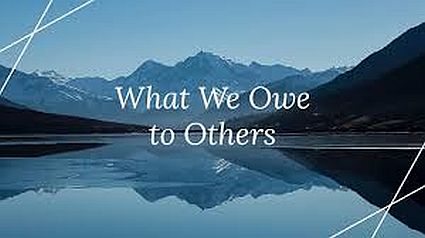As individual contributors, we are conditioned to think about what we owe our managers and leaders. Are we getting all our tasks done–making the calls, doing the outreach, meeting with customers, progressing deals, keeping our reporting updated. We are conditioned to think about hitting our goals and numbers, keeping our performance up, perhaps to keep our managers off our backs.
As managers we are, likewise, conditioned to think, “What are my people doing for me?” We assess whether they are doing all the things cited above, perhaps thinking they could do more. At the same time, we think of our own managers, and what we need to do for them. Update forecasts, manage budgets, look at reports, make sure our people are doing what our managers expect.
It’s rare that we think about what our leaders “owe” us, what we should be expecting of our own managers or leaders. Or, as leaders, we seldom think of what we “owe” our people and the organizations we lead.
What do we “owe” our people?
Where do I start? I suppose I’ll start with, “We owe our people our total commitment and support!” But what does that mean?
We do everything we can to maximize their performance–both in the short term but, also, their long term development.
We get them the resources they need to do their jobs. Whether it’s training, tools, programs, specialists.
We “protect” them from the rest of the organization. Too often, unintentionally, the organization puts roadblocks on the individuals, or consumes a lot of their time.
We serve them, in helping with their deals. We don’t inflict ourselves on them, we don’t take the deal over, we ask them, “What do you want me to help you accomplish?”
We owe them coaching and development. We must engage them in thinking, “How do we improve, what might we do differently, what might be possible?”
These are the things we “owe” them and ourselves every day. But there’s more.
We owe them our trust. Why would we have them on our teams if we don’t trust them? How will they develop trust in us, if we don’t trust them?
We owe them our high expectations of performance, not only theirs, but ours. We want them to achieve their full potential, not only today, but in their careers. We must have high expectations, we must have shared expectations, and we must do everything possible to help our people achieve that full potential.
We owe them forgiveness and learning. In setting high performance standards, we and they will make mistakes, we and they will fail. Mistakes and failure are an inevitable, not an avoidable, part of maximizing performance. It’s how we deal with these mistakes, what we learn from them, and how we grow as a result of them that drives sustained performance.
We owe sharing the joy of what it means to perform at the highest levels. Both by “walking the talk,” but also through the sheer excitement and challenge of doing a very tough job.
And we owe them our humor. We must recognize we all have a tendency to take ourselves too seriously. That we sometimes get distracted by the intensity of activity and getting our work done. Sometimes, we have to sit back and chuckle.
Ask your people what they think you “owe them.” Think about what more you want to “owe them.” Make it happen.

Leave a Reply